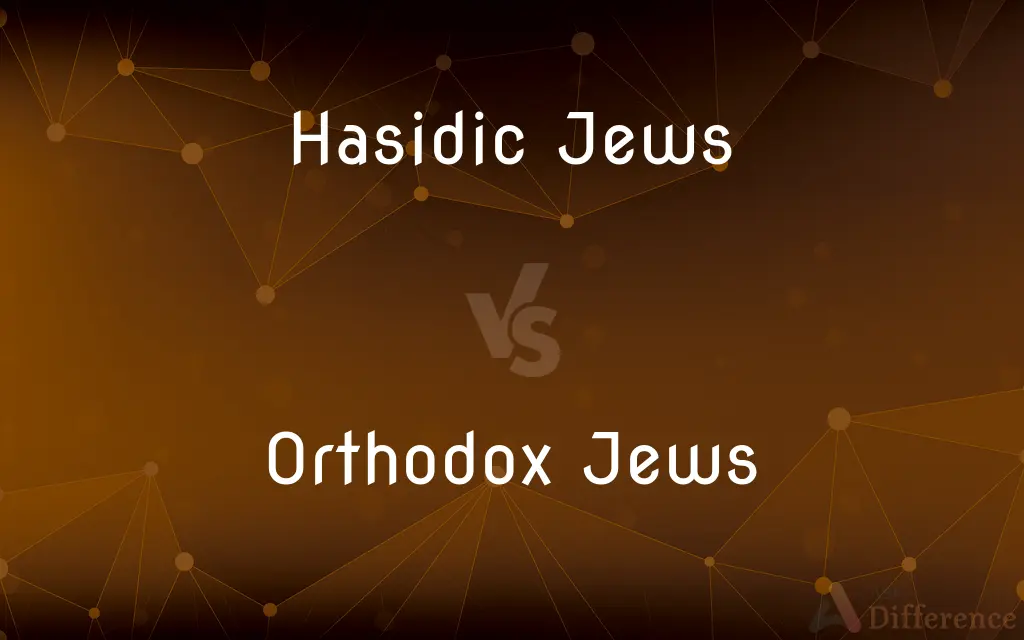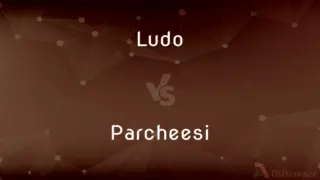Hasidic Jews vs. Orthodox Jews — What's the Difference?
By Tayyaba Rehman & Urooj Arif — Published on February 2, 2024
Hasidic Jews are a mystical, joy-focused subgroup of Orthodox Jews, who strictly adhere to traditional Jewish law and customs.

Difference Between Hasidic Jews and Orthodox Jews
Table of Contents
ADVERTISEMENT
Key Differences
Hasidic Jews, originating in 18th-century Eastern Europe, emphasize spiritual experience and joy in their religious practice. Orthodox Jews, a broader category, prioritize strict adherence to traditional Jewish law and customs. Both groups value Torah study but differ in cultural and philosophical approaches.
The dress code of Hasidic Jews often includes traditional garments like fur hats (shtreimels) and long coats, reflecting historical Eastern European Jewish attire. Orthodox Jews, while also dressing modestly, may not adhere to such specific traditional dress, often blending more with contemporary styles.
Hasidic communities are known for their charismatic leaders, known as Rebbes, who guide their followers in spiritual and practical matters. In contrast, Orthodox Judaism does not centralize spiritual leadership in the same way, with local rabbis serving more as teachers and adjudicators.
Hasidic Judaism places a strong emphasis on joyous worship and the mystical aspects of faith, inspired by Kabbalah. Orthodox Jews, while also respecting mysticism, generally focus more on the practical application of Jewish law (Halakha) in daily life.
Language plays a distinct role in these communities: many Hasidic Jews speak Yiddish as their primary language, preserving their Eastern European heritage. Orthodox Jews, however, often use the language of their respective countries, with Hebrew reserved for religious purposes.
ADVERTISEMENT
Comparison Chart
Origin
18th-century Eastern Europe
Ancient Israel, evolving through centuries
Spiritual Leadership
Centered around a Rebbe
Local rabbis without centralized leadership
Emphasis
Mysticism, joy in worship
Practical adherence to Jewish law
Language
Primarily use Yiddish
Use local languages, Hebrew for religious use
Dress Code
Traditional Eastern European Jewish garments
Modest dress, often blending with local styles
Compare with Definitions
Hasidic Jews
Hasidic Jews are a Jewish spiritual revival movement.
The Hasidic Jews in Brooklyn are known for their lively religious celebrations.
Orthodox Jews
Orthodox Jews prioritize Torah study and daily prayer.
In Orthodox Jewish traditions, men gather daily for morning prayers.
Hasidic Jews
Hasidic Jews emphasize mystical experiences and joy in worship.
Hasidic Jews often engage in spirited dancing during their religious ceremonies.
Orthodox Jews
Orthodox Jews dress modestly, following ancient Jewish teachings.
Orthodox Jews are easily recognized by their modest attire in public.
Hasidic Jews
Hasidic Jews follow the teachings of their spiritual leaders, Rebbes.
The Hasidic Jews gathered around their Rebbe to receive his blessings.
Orthodox Jews
Orthodox Jews strictly observe traditional Jewish law and customs.
Orthodox Jews adhere to kosher dietary laws very strictly.
Hasidic Jews
Hasidic Jews often speak Yiddish and wear traditional Eastern European attire.
In the Hasidic Jewish community, Yiddish is spoken in both homes and synagogues.
Orthodox Jews
Orthodox Jews are diverse, ranging from modern to traditional communities.
In Jerusalem, you'll find a variety of Orthodox Jewish communities, each with their own customs.
Hasidic Jews
Hasidic Jews are known for their insular communities and strong family values.
The Hasidic Jews in that neighborhood have their own schools and social systems.
Orthodox Jews
Orthodox Jews often lead lifestyles that balance religious commitments with modern life.
Many Orthodox Jews use technology in a way that aligns with their religious principles.
Common Curiosities
Do Hasidic Jews speak a different language?
Many Hasidic Jews speak Yiddish as a first language, alongside Hebrew for religious purposes, while Orthodox Jews typically speak the language of their country.
Are there different sects within Hasidic Judaism?
Yes, there are various sects, each following a specific Rebbe and customs.
Is kosher food important to both Hasidic and Orthodox Jews?
Yes, both groups adhere to kosher dietary laws, although specific practices may vary.
What is the primary difference between Hasidic and Orthodox Jews?
Hasidic Jews are a subgroup of Orthodox Jews, known for their mystical practices and joyous worship, while Orthodox Jews broadly adhere to traditional Jewish law and customs.
What role do women play in Hasidic and Orthodox Jewish communities?
Women in both communities are typically responsible for maintaining Jewish traditions in the home, but their roles may vary with different levels of engagement in communal and religious life.
Do Hasidic Jews interact with people outside their community?
Interaction varies; some Hasidic Jews maintain insular communities, while others engage more with the broader society.
Do Hasidic and Orthodox Jews participate in politics?
Participation varies; some are actively involved, while others prefer to focus on their religious communities.
Do all Orthodox Jews dress the same way?
No, dress varies among Orthodox Jews. Hasidic Jews often wear traditional Eastern European clothing, while other Orthodox Jews may adopt more contemporary styles.
How do Hasidic and Orthodox Jews educate their children?
Education focuses on religious studies and traditional values, with variations in the inclusion of secular education.
Are Hasidic and Orthodox Jews found worldwide?
Yes, both groups have communities globally, although their size and practices may vary by region.
How do Hasidic and Orthodox Jews view modern technology?
Views vary widely; some communities embrace technology, while others limit its use to maintain traditional values.
How do Hasidic and Orthodox Jews celebrate holidays?
Both groups observe Jewish holidays with traditional practices, but Hasidic celebrations often include more mystical and joyous expressions.
Can someone convert to Hasidic or Orthodox Judaism?
Conversion is possible but involves a rigorous process of study and adherence to Jewish law, overseen by a rabbinical authority.
Are there differences in prayer practices between Hasidic and Orthodox Jews?
While both pray three times a day, Hasidic Jews may include additional mystical elements in their prayers.
How important is the land of Israel to Hasidic and Orthodox Jews?
Both groups generally view Israel as central to Jewish identity, but their political and spiritual connections to it can vary.
Share Your Discovery

Previous Comparison
Yu-Gi-Oh! vs. Yu-Gi-Oh! 5D’s
Next Comparison
Ludo vs. ParcheesiAuthor Spotlight
Written by
Tayyaba RehmanTayyaba Rehman is a distinguished writer, currently serving as a primary contributor to askdifference.com. As a researcher in semantics and etymology, Tayyaba's passion for the complexity of languages and their distinctions has found a perfect home on the platform. Tayyaba delves into the intricacies of language, distinguishing between commonly confused words and phrases, thereby providing clarity for readers worldwide.
Co-written by
Urooj ArifUrooj is a skilled content writer at Ask Difference, known for her exceptional ability to simplify complex topics into engaging and informative content. With a passion for research and a flair for clear, concise writing, she consistently delivers articles that resonate with our diverse audience.
















































